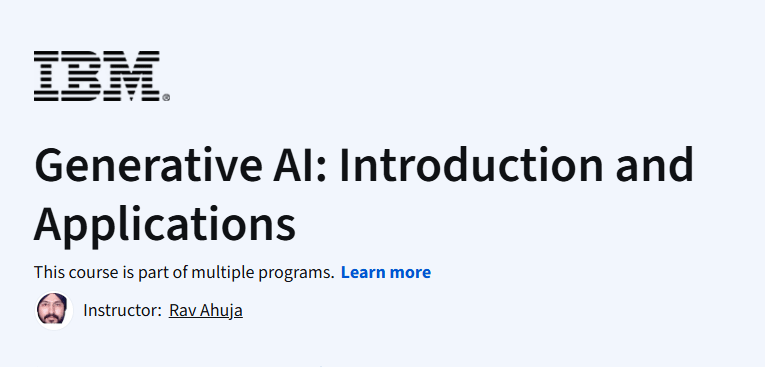What will you learn in Generative AI: Introduction and Applications Course
Understand the fundamentals of generative AI and how it differs from traditional AI models
Explore real-world applications of generative AI in industries like design, healthcare, and business
Gain insights into tools such as large language models (LLMs), diffusion models, and image generators
Analyze the ethical considerations and responsible use of generative AI
Learn how to integrate generative AI into workflows to boost creativity and productivity
Program Overview
Module 1: Introduction to Generative AI
⏳ 1 week
Topics: What is Generative AI, comparison with traditional AI, history and breakthroughs
Hands-on: Identify common tools like ChatGPT, DALL·E, and Midjourney used in current applications
Module 2: Generative AI in Action
⏳ 1 week
Topics: Use cases in content creation, healthcare diagnostics, marketing, and more
Hands-on: Evaluate how companies apply generative AI to solve real-world problems
Module 3: Tools & Technologies
⏳ 1 week
Topics: LLMs, diffusion models, transformers, multimodal AI
Hands-on: Explore sample tools and platforms for generating text, images, and code
Module 4: Ethical Considerations & Responsible Use
⏳ 1 week
Topics: Deepfakes, misinformation, copyright concerns, bias in AI
Hands-on: Analyze scenarios to determine responsible AI usage practices
Module 5: The Future of Generative AI
⏳ 1 week
Topics: Evolving architectures, emerging tools, trends in creativity and automation
Hands-on: Predict how generative AI will shape industries and human work
Get certificate
Job Outlook
Generative AI is one of the fastest-growing tech fields, with rising demand across industries
Roles such as AI Product Manager, Prompt Engineer, and Applied Researcher are emerging
Upskilling in generative AI enhances career prospects in tech, design, marketing, and more
Professionals can leverage generative tools to become more efficient and creative at work
Specification: Generative AI: Introduction and Applications Course
|
FAQs
- No prior AI or programming experience is required.
- The course introduces foundational concepts in simple language.
- Basic computer literacy is sufficient for following exercises.
- Concepts are explained with real-world examples.
- Learners can gradually explore hands-on applications after theory.
- Content generation, such as text, images, and music.
- AI-assisted design and prototyping in engineering and architecture.
- Personalized recommendations in marketing and e-commerce.
- Data augmentation for scientific research and simulations.
- Automating repetitive creative and analytical tasks.
- Provides a strong conceptual understanding of AI models.
- Prepares you for entry-level AI or data science roles.
- Knowledge can support roles in AI product development.
- Helps in understanding AI tools for research and business applications.
- A portfolio of generative AI projects can attract employers.
- Cloud-based platforms like Google Colab or Jupyter Notebook.
- Access to Python programming environment (optional for beginners).
- Pre-trained AI models for experimentation.
- Libraries such as TensorFlow, PyTorch, or Hugging Face.
- A stable internet connection for downloading datasets and running models.
- Start with small projects like text or image generation.
- Experiment with AI tools for creative tasks.
- Participate in AI competitions and hackathons.
- Document projects and build a GitHub portfolio.
- Explore advanced tutorials and case studies to deepen knowledge.





